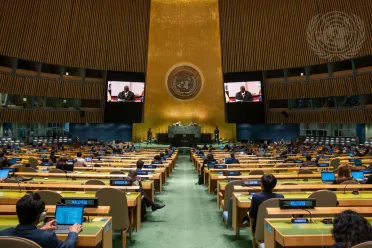Statement
Statement summary
YOWERI KAGUTA MUSEVENI, President of Uganda, said the COVID-19 pandemic and its consequences can only be addressed through collective action. Vaccinating everybody is the best way forward. More action must be taken to ensure that equitable and affordable access to quality vaccines is at the heart of the global recovery. Withholding vaccines at the expense of developing countries, also known as vaccine nationalism, is wrong, but it is also a lesson for those developing countries which do not want to innovate. “It is good because it wakes up those who are asleep, waiting to be saved by others.” Uganda is developing its own vaccine and it invites interested partners to support that initiative by providing the required raw materials, he said.
The pandemic has disrupted Uganda’s progress towards achieving some of the Sustainable Development Goals, but it has given impetus to its industrialization drive and prompted a debate about ways to build resilience to withstand such shocks, he said. The Government has also embraced digital transformation, which presents Uganda with significant opportunities.
The global response to climate change must be strengthened in the context of sustainable development and poverty eradication through multilateral action, he said. For Uganda, climate change has led to prolonged droughts, floods, landslides, erratic rainfalls and the melting of the ice cap atop Mount Ruwenzori. The water level of Lake Victoria has risen to the point where communities must relocate further away from its shore. Uganda is not a significant contributor to climate change, but it is taking action by investing in climate adaptation and mitigation measures, including the production of more clean energy and expanding its forests and wetlands.
Looking ahead to the upcoming COP26 in Glasgow, he called on developed countries to make good on their pledge under the Paris Agreement to provide $100 billion a year to help developing countries to adapt to and mitigate the effects of climate change. Like most countries, Uganda continues to experience biodiversity loss, with some species now in danger of extinction. With international support, it is mainstreaming biodiversity conservation into its national development plan. It is restoring 64,000 hectares of degraded wetlands, which will benefit 4 million farmers; planting trees to grow its forest cover to 24 per cent by 2030; and addressing the poaching and illegal trade in wildlife. The fifth United Nations Conference on Least Developed Countries in Doha, on 23-27 January 2022, should agree on a programme of action that calls for a strong global partnership that helps those States address existing structural constraints.
Spotlighting the threat posed by ISIL/Da’esh, Al-Qaida, Al-Shabaab, Boko Haram and the Allied Democratic Forces, he said the international community’s resolve to fight terrorism must never waver. Uganda will continue to support global and regional counter-terrorism efforts. The United Nations should continue to support conflict prevention and resolution initiatives by the African Union and the Intergovernmental Authority on Development (IGAD). He added that Uganda is committed to supporting counter-terrorism and stabilization efforts in Somalia, Sudan, South Sudan and the east of the Democratic Republic of the Congo.
Full statement
Read the full statement, in PDF format.
Photo

Previous sessions
Access the statements from previous sessions.
